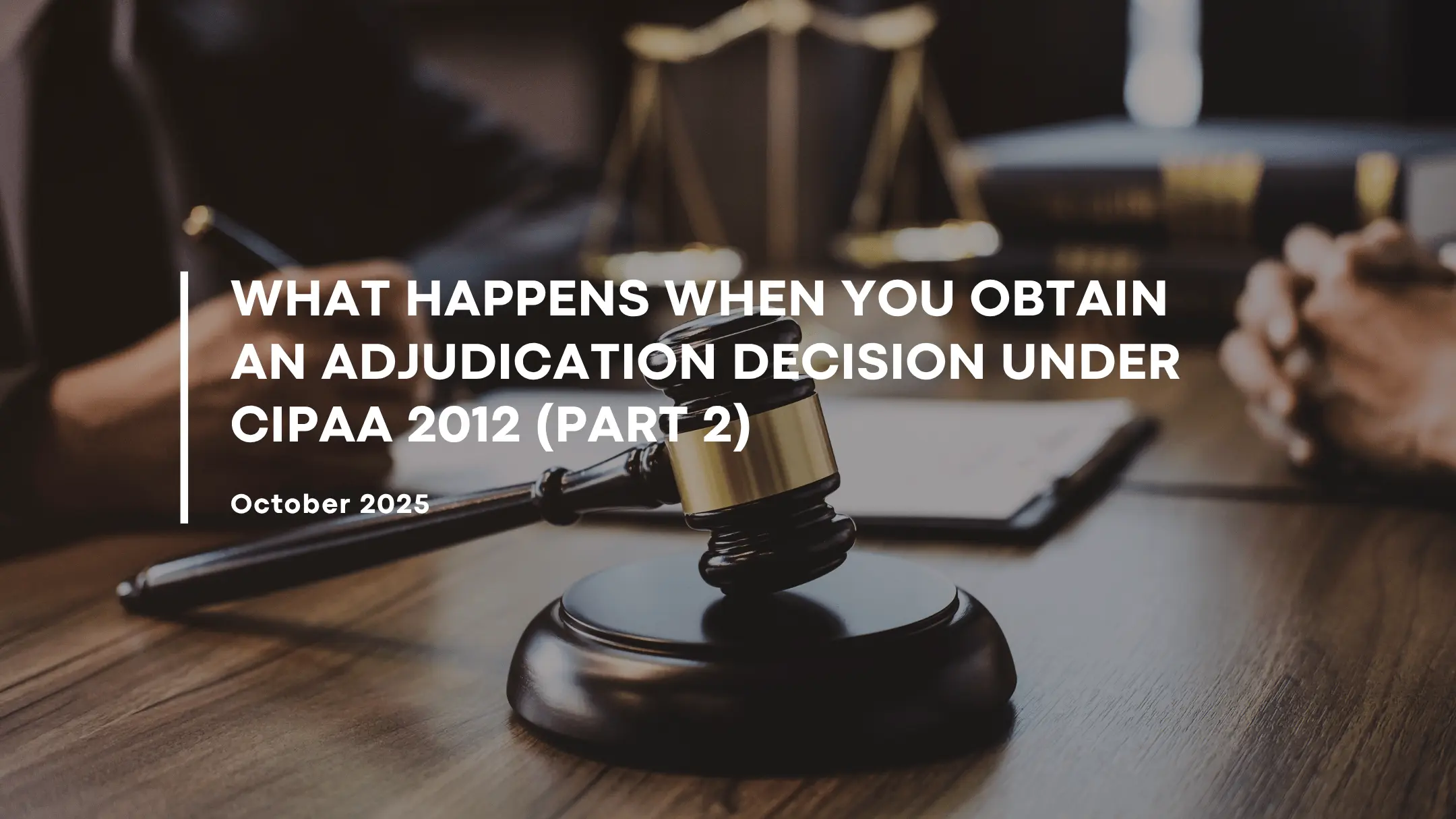A. What’s Next Following an Adjudication Decision?
Adjudication under the Construction Industry Payment and Adjudication Act 2012 (“CIPAA”) is a fasttrack statutory dispute resolution mechanism aimed at ensuring cash flow in the construction industry. Once an adjudicator delivers their decision, parties often ask — what happens next? Many assume an adjudication decision is final, but it carries only temporary finality, a concept that often causes confusion in practice.
This article explains the legal effect of a CIPAA adjudication decision, the steps available to enforce or challenge it, and the strategic considerations that follow, whether you are the successful party or otherwise.
1) Effect of an Adjudication Decision
An adjudication decision is binding unless:
- it is set aside by the High Court on any of the grounds referred to in section 15 of the CIPAA;
- the subject matter of the decision is settled by a written agreement between the dispute parties; or
- the dispute is finally decided by arbitration or the court.
2) Enforcement of an Adjudication Decision
Once an adjudication decision has been obtained, the successful party may enforce the decision by the provided mechanism.
The party may enforce the adjudication decision by applying to the High Court to have the adjudication decision enforced as if it is a judgement or order of the High Court. The High Court may make an order in respect of the adjudication decision either wholly or partly and may make an order in respect of interest on the adjudicated amount payable.
3) Suspension or Reduction of Rate of Progress of Performance
A successful party may suspend the performance or reduce the rate of progress of the performance of any construction work or construction consultancy service under a construction contract. This is applicable only if the adjudicated amount pursuant to an adjudication decision has not been paid wholly or partly after the receipt of the adjudicated decision under subsection 12(6) of the CIPAA.
Furthermore, the party who intended to do so must give a written notice of intention to the other party if the adjudicated amount is not paid within 14 days from the date of receipt of the notice. Upon expiry of the 14 days period, the party intending to suspend the performance or reduce the rate of progress of performance shall give the right to suspend performance or reduce the rate of progress of performance of any construction work or construction consultancy service under the construction contract.
4) Direct Payment from Principal
If the party against whom an adjudication decision was made fails to make payment of the adjudicated amount, the successful party who obtained the adjudication decision in his favour may make a written request for the payment of the adjudicated amount direct from the principal of the party against whom the adjudication decision is made.
Upon receipt of the written request, the principal shall serve a notice in writing on the party against whom the adjudication decision was made to show proof of payment and to state that direct payment would be made after the expiry of ten working days of the service of the notice.
5) Winding Up a Company
A successful party in an adjudication proceeding may commence winding-up proceedings against the losing party relying on the adjudication decision.
The Court of Appeal in Sime Darby Energy Solutions Sdn Bhd v RZH Setia Jaya Sdn Bhd [2022] 1 MLJ 458 held it is settled law that one may proceed to wind up a company based on an adjudication decision under CIPAA, even without having to first apply to enforce the same under section 28 of the CIPAA.
B. Challenging the Adjudication Decision
1) Setting Aside of Adjudication Decision
The losing party may apply to the High Court to set aside an adjudication decision on any of the following grounds:
- The adjudication decision was improperly procured through fraud or bribery;
- There has been a denial of natural justice;
- The adjudicator has not acted independently or impartially; or
- The adjudicator has acted in excess of his jurisdiction.
2) Stay of Adjudication Decision
A party may request for a stay of an adjudication decision in the following circumstances:
- An application to set aside the adjudication decision under section 15 of the CIPAA has been made; or
- The subject matter of the adjudication decision is pending final determination by arbitration or
the court.
The High Court may grant a stay of the adjudication decision, or order the adjudicated amount or part of it to be deposited with the Director of the AIAC, or make any other order as it thinks fit.
C. Recent Developments on the CIPAA provisions
The following cases illustrates the recent developments on the CIPAA provisions:
- SPM Energy Sdn Bhd & Anor v Multi Discovery Sdn Bhd [2025] MLJU 515: the Court of Appeal held that the prohibition of conditional payment clause under section 35 of the CIPAA 2012 applies to disputes before Court / Arbitral Proceedings, and is not confined to adjudication proceedings.
- Intisari Mulia Engineering Sdn Bhd v TUV SUD (Malaysia) Sdn Bhd [2025] 5 MLJ 335: The term “construction work” will include the procurement of construction materials, equipment or workers, as necessarily required for any works, but those procurement of materials, equipment or workers must be related to the “construction work” as defined under section 4 of the CIPAA
- Anas Construction Sdn Bhd v JKP Sdn Bhd [2024] 2 CLJ 665: An adjudicator’s jurisdiction is limited to matters referred to the adjudicator pursuant to Section 5 and 6 of CIPAA. An adjudicator is not empowered to rely on a clause in a contract not mentioned in a Payment Claim under Section 5 nor Payment Response under section 6 of the CIPAA.
- Bluedream City Development Sdn Bhd v Pembinaan Bina Bumi Sdn Bhd [2024] 4 MLJ 67: the Court of Appeal held that an enforced adjudication decision was a debt which amounted to a proper basis upon which the winning party could issue a winding up petition. This debt ceased to be disputable in the winding up proceedings because the disputed debt has been independently adjudicated by a neutral party.
- Econpile (M) Sdn Bhd v ASM Development (KL) Sdn Bhd and another appeal [2024] 3 MLJ 157: held that an adjudication decision that has been enforced pursuant to section 28 of the CIPAA cannot be stayed pursuant to section 16(1)(b) of the CIPAA.
- Utama Motor Workshop (S) Sdn Bhd v Besicon Engineering Works Sdn Bhd [2023] 8 MLJ 458: the High Court declared the adjudication decision to be void and ordered the adjudicator to refund all the fees and expenses paid to the parties. It was held that unless parties agreed to extend the prescribed time under section 12(2)(c) of the CIPAA, the adjudicator cannot unilaterally extend the time for him to deliver the decision.
- JDI Builtech (M) Sdn Bhd v Danga Jed Development Malaysia Sdn Bhd (previously known as Greenland Danga Bay Sdn Bhd) [2024] 4 MLJ 29: The overarching pre-condition to apply for direct payment from the principal under section 30 of the CIPAA 2012 is that there first be money due or payable by the Principal to the losing party in adjudication (Main Contractor) at the time the Principal received the successful party / Subcontractor’s written request.
The principal’s failure to give notice to its Main Contractor under section 30(2) of the CIPAA 2012 and the failure of the Main Contractor to show proof of payment does not automatically render the Principal liable to make direct payment as this would bypass the requirement of section 30(5) of the CIPAA 2012.
© TSL Legal
This article is intended to provide general information only and does not constitute legal advice. It should not be used as a substitute for professional legal consultation. We recommend seeking legal advice before making any decisions based on the information available in this article. TSL Legal fully disclaims responsibility for any loss or damage which may result from relying on this article.
Further information
Should you have any questions on the implications of this Act or how this development may affect you or your business, please get in touch with:

